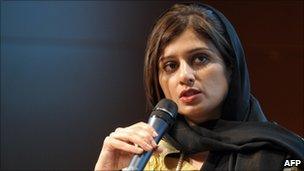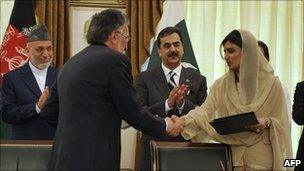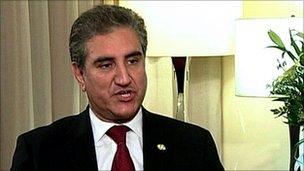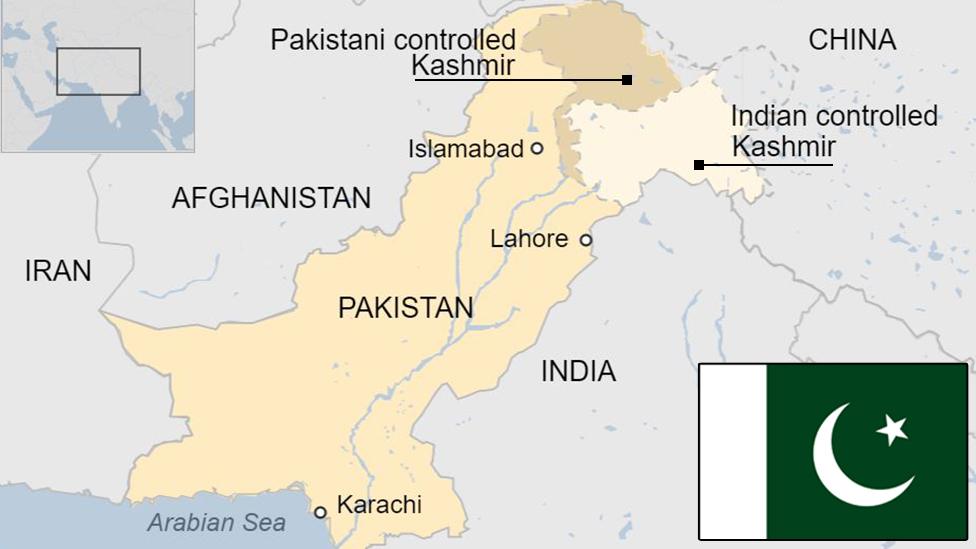Will Pakistan's first woman foreign minister make a difference?
- Published

Ms Khar is seen as young and inexperienced
Pakistan's new foreign minister Hina Rabbani Khar, who was sworn in earlier this week, takes charge at a time when apparent contradictions in the country's foreign policy are coming to a head.
Being the first woman in the post she may be able to project a softer image of Pakistan abroad, some say.
But many doubters point to her young age - 34 - and the fact that she has a degree in hotel management.
They suggest she may lack the stature and experience necessary for her new post, given the powerful military's long history of involvement in Pakistan's foreign policy.
To be fair to her, countless men in this role have in the past failed to challenge the military's perception of how to run the country's foreign affairs. Will she fare any better?
Family politics
Ms Khar belongs to a generation of parliamentarians who entered politics by default - they happened to be sons, daughters or wives of politicians who were disqualified under a 2002 law that required election candidates to hold a college degree.
A post-graduate in hotel management from the University of Massachusetts in the US, she was the obvious choice to replace her father, Ghulam Noor Rabbani Khar, a big landowner in Muzaffargarh district in Punjab province.
She has won two consecutive elections from his old seat, not because of her own charisma or political weight, say analysts, but due to her family's political influence in the area.

Ms Khar has been acting foreign minister since February
This explains why she was able to win despite switching political parties - she triumphed as a candidate for the PML-Q party in 2003 and for the PPP, which won elections in 2008.
Despite her age and background, she is not new to high office.
During the military regime of Gen Pervez Musharraf, when the PML-Q formed the government, she became the deputy minister of economic affairs and dealt extensively with the donor community during the 2005 earthquake that hit northern Pakistan.
When the PPP ousted the PML-Q in the 2008 elections, she again held the same portfolio and was the first woman minister to present the national budget in parliament in 2009.
Cabinet reshuffle
Ms Khar is relatively new to her brief, having spent only five months as deputy foreign minister.
But since her predecessor, Shah Mehmood Qureshi, lost his job in a reshuffle in February, she has been in charge of the ministry.
Her appointment as Mr Qureshi's replacement comes just a week before two major foreign affairs events, where her mettle will be tested.
First is the meeting of the Association of South East Asian Nations in Indonesia, where she is likely to meet the US Secretary of State, Hillary Clinton, on the sidelines.

Ms Khar's predecessor, Shah Mehmood Qureshi, lost his job in a reshuffle
The second, and more important in a regional context, is the ministerial-level meeting with nuclear-armed arch-rival India, which is aimed at restarting a composite dialogue that was derailed by the 2008 Mumbai attacks.
Whether Ms Khar can she make herself sound credible as the chief diplomat of a troubled, and important, country at these events will be revealed over time.
She is educated and articulate. She is also a young and photogenic woman. International interlocutors and the global television audience may find her a welcome change from Pakistan's infamous, invariably male old guard.
But there are few in Pakistan who expect her to show the kind of resolve and charisma it would take to straighten out the folds and crumples of Pakistani foreign policy.
Security versus diplomacy
For decades, this policy has been controlled by the country's powerful security establishment, and reflects the disconnect between its national security priorities and diplomatic compulsions.
There have been times when the country's forces have gone to war - but the foreign office insisted that those fighting on the ground were not Pakistani soldiers.
The foreign ministry's basic job of sorting out differences with neighbours with a view to promoting regional trade and creating economic opportunities for the local population has also remained hostage to military priorities.
Opposition leader Nawaz Sharif has openly said in recent statements that Pakistan's policy towards countries like India, Afghanistan, the US and others ought to be shaped by parliament, not the generals.
The present government, which came to power in 2008, made a number of attempts early on to rein in the military and take control of foreign policy, but was rebuffed.
Over the past 18 months or so, say analysts, it has given up the idea of sudden change in favour of an evolutionary approach.
The military itself is under pressure from international and domestic players to review its relations with domestic politicians and regional rivals like India and Afghanistan.
Many in Pakistan believe the transformation is likely to be painful and slow.
They expect the anti-Americanism and anti-Indianism of some crucial state players in Pakistan to continue, at least for now.
They also expect incremental, carefully calibrated progress to take place in Pakistan's engagement with both India and the West.
According to these analysts, Ms Khar is unlikely to be able to affect the course of events one way or the other.
- Published15 March 2024
